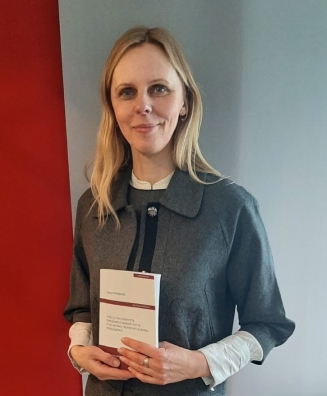
March 18th, 2021, Mykolas Romeris University (MRU) doctoral law student Daiva Petrėnaitė successfully defended her PhD dissertation, "Prospects for the Recognition of the Right to Gender Identity and Regulatory Issues Related to Gender Reassignment."
The doctoral thesis was written during 2015–2021 at MRU under the right to organize doctoral studies granted to MRU and Kaunas-based Vytautas Magnus University.
Scientific Supervisors:
Prof. Dr. Toma Birmontienė (MRU, Social Sciences, Law, S 001), 2019–2021;
Prof. Dr. Jonas Juškevičius (MRU, Social Sciences, Law, S 001), 2018–2019;
Assoc. Prof. Dr. Agnė Širinskienė (MRU, Social Sciences, Law, S 001), 2015–2018.
Defence Council
Chairman:
Prof. Dr. Gediminas Mesonis (MRU, Social Sciences, Law, S 001).
Members:
Prof. Dr. Darijus Beinoravičius (MRU, Social Sciences, Law, S 001);
Prof. Dr. Ieva Deviatnikovaitė (MRU, Social Sciences, Law, S 001);
Prof. Dr. Vytautas Mizaras (Vilnius University, Social Sciences, Law, S 001);
Prof. Hab. Dr. Anna Rytel-Warzocha (University of Gdansk, Poland, Social Sciences, Law, S 001).
The dissertation deals with rights such as the right to gender reassignment and freedom of gender identity. They are regarded as controversial and as such are still being ignored or less outspoken in the public discourse in Lithuania just as everywhere else. Transsexuality is no exception. It is related to the right of an individual to gender identity and triggers the need for legal regulation. The dissertation raises the following issues: ‘What is gender identity?’ and ‘Whether it is important to recognise the freedom to choose gender identity within the society and the law?’ ‘To what extent does it a reflect the solution of exercising legal rights by a person a er gender reassignment?’ ‘Why transsexuality as part of personal gender identity is recognised in medical science as a gender identity disorder?’
According to information provided in 2011-2017, there were from 50 to 200 transgender individuals in Lithuania. Considering that they suffer from discrimination and various forms of homophobia, there may be more. They are afraid to speak out about this in public. Such individuals are socially marginalised and suffer from poorer protection of their right to self-expression. Lesbian, gay, bisexual and transgender persons account for a minority of the population which is invisible, unspoken of, and is discriminated against.